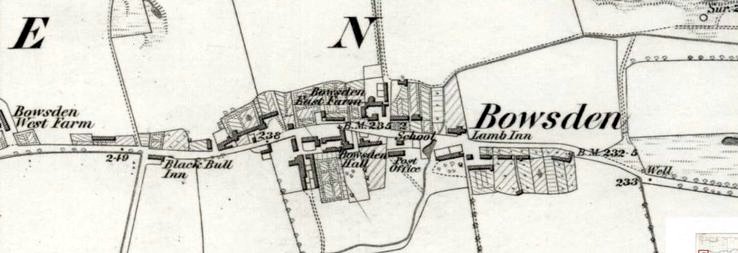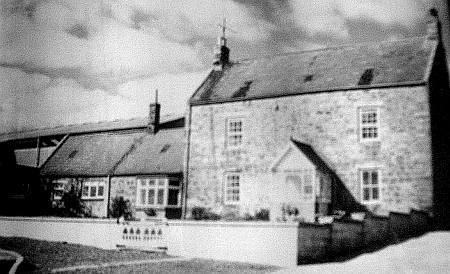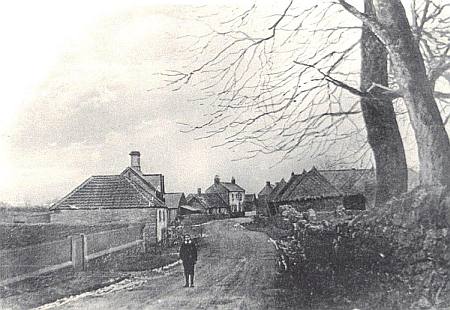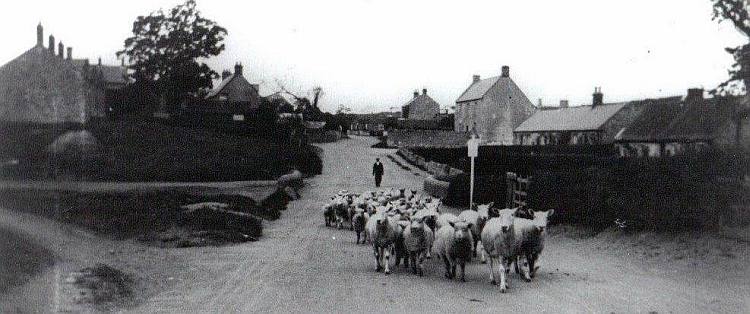Luke Moody was the tenant of Bowsden Farm [Bowsden West Farm], in Bowsden, Northumberland, in the years c1823 – 1833, before he and his family emigrated to Canada in 1834. The correspondence of the solicitors’ firm Dickson, Archer & Thorp, some of which is now held by Northumberland Archives at Woodhorn, included a series of letters which record much of Luke Moody’s career as a Northumberland farmer. The letters, written by Andrew Bell of Woodside, Bowsden, Luke Moody, tenant of Bowsden Farm [Bowsden West Farm], and others, to Messrs Thorp & Dickson, Solicitors, Alnwick, between 1829 and 1833, reveal the difficulties experienced by the tenant. Luke was keen to try out new methods of husbandry, and although not usually successful, remained optimistic, but ultimately failed.
Bowsden farms in the early nineteenth century
Bowsden [West] Farm c500 acres
Bowsden Hall Farm c330 -390 acres
Bowsden East Farm c100 acres often let with Whistlebare
Villa Farm c30 acres.
Bowsden West Moor [Whistlebare] c57 acres
Bowsden Moor c 437 acres, often let with Bowsden Hall
Nicholas Francis Skelly Davison, the landowner
The Davison family of Little Mill, owned land in Bowsden from the late seventeenth century, if not before. Nicholas Francis Skelly Davison was born in Twickenham, Middlesex, in 1794 and educated in Alnwick. He entered Caius College, Cambridge as a scholar in 1813, qualified as a Medical Doctor in 1832 and practised in Russell Square, London. His freehold property in Bowsden allowed him to vote in the contested election for the county of Northumberland, in 1826. Thorp and Dickson Solicitors, Alnwick, dealt with the rent collection and any issues concerning the farm. Nicholas died at St Albans, Hertfordshire, in 1868. Although the County History of Northumberland states that Knight Gregson of Lowlynn, purchased Bowsden West in 1899, to add to his portfolio of Bowsden properties, the General County Rate of 1869 suggests that the purchase was made on the death of Davison or possibly before.
Luke Moody, the tenant c1823 – 1833
Luke Moody and his wife Jane (Murray) had at least nine children baptised by a Roman Catholic priest between 1802 and 1821, in the following places – Lowick North Field, Fenwick, Haggerston and Bowsden.
In May 1817, Luke was granted an 11 year lease of 56 acres of Bowsden Hall Farm land, ‘with the Minerals within and under the whole farm’: by January 1824, he was described as ‘tenant from year to year’.
Bowsden Farm was offered ‘for let’ in the Berwick Advertiser of 7 December 1822, to be entered the following May. It consisted of c517 acres of arable and pasture, with coal and limestone present. Richard Hall had been the tenant for at least 16 years. Luke may have taken over the tenancy in 1823 and was certainly there by 1824.
Andrew Bell the tithe collector for Bowsden
Andrew Bell, whose father was a tenant of Francis Sitwell of Barmoor Castle, was the tithe collector for Bowsden, Norham and Cornhill, but also acted as an advisor to the Solicitors and regularly commented on Luke’s proposals and the state of the farm.
The letters 1829 – 1833
February 1829 – Andrew wrote that to have the whole of the Farm in two years Grass or 5 Shifts although preferable, could not be done for a few years as the Land ought to be properly cleansed and Fallowed before it is sown with Grass Seeds. Mr Hall, the previous tenant may have neglected the farm or continued with old methods, but what had Luke being doing during his first few years as tenant? Luke owed tithes due for 1827. His horses had distemper, and one that he had hoped to sell to Andrew Bell, was dangerously ill.
April 1829 – Corn prices were lower than he had expected: he felt he might as well have sold two months ago.
May 1829 – Luke stated that he sent every shilling received from the farm to Thorp and Dickson & will do so until such times as the Indulgence you was pleased to grant me on the Mode of Husbandry be proven, which will be in harvest when I then expect it will prove satisfactory both to my Landlord & myself as I never had a better prospect of a good Crop. He hoped to pay part of the Corn Tithe arrears.
October 1829 – Nicholas Davison wrote to the solicitors expressing concern that Mr Moody’s arrears have increased since the indulgence was allowed him. I understand that the arrear was to be gradually diminished and entirely liquidated by September 1830, but it appears that at present it exceeds one year’s rent and if another payment is not made before the 12th of next month the rent of 3 half years will be due.
November 1829 – After speaking to Luke about the very bad state of the farm, Andrew encouraged him to quit. Luke wanted to stay for another year as he believed that the markets would change but if they did not, he would be willing to quit. Andrew contacted Thorp and Dickson, offering to pay Luke’s current tithe of £65.
October 1830 – Luke was still keen to remain as tenant, but Andrew thought that he should take a smaller farm more within his Capital as it would require a Considerable Outlay to Clean it and put it in proper Condition.
November 1830 – Luke thanked Thorp and Dickson for putting off the rent for a backwardly harvest which he finished cutting 27 October. He bound himself to quit the farm in May 1832 if he was still in arrears at Martinmas 1831.
January 1831 – Luke Moody’s Accounts
RENT
May 1829 £191 2s 11d
May 1830 £440
November 1830 £220
Total £851 2s 11d
Received at various times £170
Due November 1830 £681 2s 11
Mr Nater’s Account
Half year instalment due 24 December 1830 £140
Cash in hand to make payment £102 2s 0d
[Mr Nater leased the Tithes from the Dean and Chapter of Durham.]
1831 and 1832 continued in the same vein with Luke making irregular small payments and Andrew advising him to quit.
January 1833 – Eventually the decision was taken that Luke should leave the farm and he was advised to find a person to act for him. He apparently consulted an Attorney in Berwick and was anxious to obtain a copy of the lease, as he felt that he had great Claims on Mr Davidson for not fulfilling his Agreements. Andrew, although receiving interest in the Farm, was concerned that the bad state would put people off.
February 1833 Offers or Interest received
John Bone of Barelees offered £375, provided the term of years and other conditions of Lease met his approbation.
Henry Barber of Bowsden Hall offered £360 per annum, provided we can agree as to covenants and that you will support the price of Wheat forty-five per Boll of Six Imperial Bushels.
Messrs John & George McGregor offered via Mr Appleby. I can commend to you as good tenants, & quite equal to the Farm. They hold a Mill & Farm under Lady Haggerston at Bridge Mill which they have improved very much since they entered to them. [They decided to take Wind Mill Hill Farm instead].
Mr Brown was considering another farm if his offer for Bowsden was not accepted. [Mr Brown became the next tenant of Bowsden West Farm in either March or May 1833].
Mr Berwick of Detchant offered £315 per annum for 21 years. Maybe they were asked to increase their offer as they wrote again saying that they had not seen it since Mr Moody came to it and had heard that it was in a miserable state.
Thomas Scowther of Kyloe wrote that Mr Scott of Beal, had offered to write a character reference for him. He offered £391, provided we can agree in the System of Husbandry and other Particulars.
Dickson, Archer & Thorp Solicitors Letters originally from Dickson, Archer & Thorp Solicitors, who closed in 2003. For more information on the Collection, refer to the Northumberland Archives website.
To view the original letters transcribed CLICK HERE
To view the original letters in facsimile CLICK HERE
Bowsden West Farm in 1833
Was it due to Luke Moody’s lack of experience, shortage of capital, or the state of the markets that caused him to fail? Or was it a combination of all three. The offers of rent received in 1833, were considerably lower than the £440 per annum shown in Luke’s accounts: no doubt due to the poor condition of the farm. How much did Luke owe when he left?
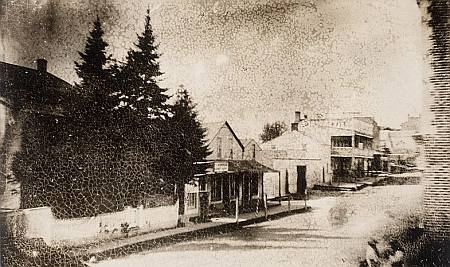
An image of Main Street, Newmarket, near Toronto in 1856. The Moody family emigrated from Bowsden in Northumberland, England, in 1834, to Newmarket in Canada. (Toronto Public Library: public domain).
Emigration to Canada In 1834 Luke Moody and his wife Jane Moody (née Murray), along with their seven children (two having died) emigrated to Canada. They settled in the farming town of Newmarket, and then moved on to Toronto where they both died.
In 1850 their youngest son George Moody, along with his wife Mary Moody (nee McNamara), moved to Troy, New York, from Toronto, where they had married in 1845. They then moved on to Titusville, Pennsylvania, in 1856. Mary died there in 1892 and George in 1910, aged 91 years. They had two children, Luke J. Moody, and James Moody, six grandchildren, and two great grandchildren. George’s brother Luke Moody, died in Toronto, Canada in 1854, aged 44.
Further research is ongoing into the Moody family; and anyone with further information should contact the Friends, through this website.
Sources:
Northumberland Archives
NRO: QRP 41-73, Land Tax Assessments Lowick
NRO: QRP 93 [Glendale] General County Rate of 1869
Berwick Archives
Berwick Roman Catholic, Berrington and Haggerston Transcripts
The County History of Northumberland Vol II, p 410 -412; Vol XIV, [Bowsden]
Letters in private ownership, purchased from Glendale Antique Centre, Wooler, 2014
Munksroll.rcplondon.ac.uk/Biography/Details/1192/Royal College of Physicians/Lives of the Fellows – Vol IV, p 8
Findmypast
St Albans Burial Register
Newcastle Courant 8 May 1819, Berwick Advertiser 7 December 1822, Newcastle Courant 3 January 1824, and London Courier and Evening Gazette 29 March 1825
Lot124, bundle of letters and tithe accounts from Andrew Bell of Woodside and Berwick, 1824 to 1829, relating to Norham, Cornhill and Bowsden. Thomson, Roddick & Medcalf, Fine Art Auctioneers, Carlisle
Ancestry
Titusville Herald, Tuesday, May 3, 1910, Titusville – newspaperarchive.com
Banner: OS Map: Surveyed 1860. Published 1866

